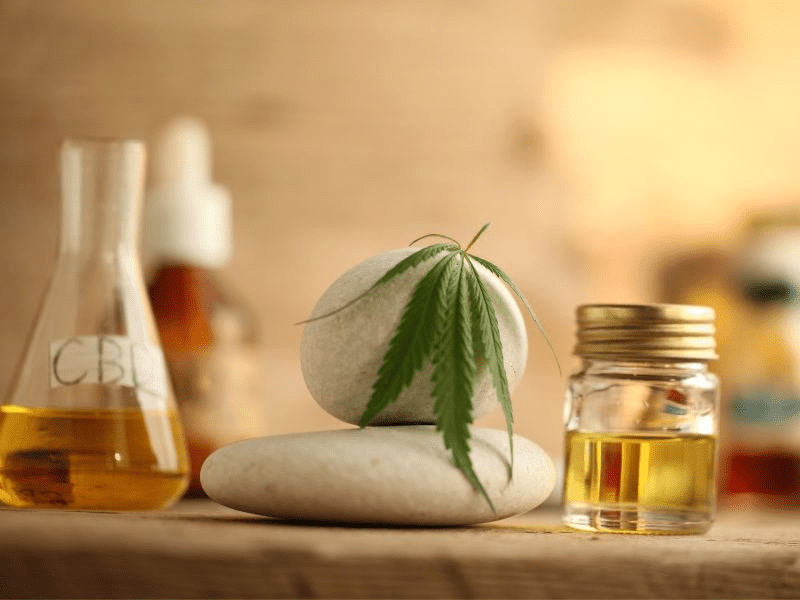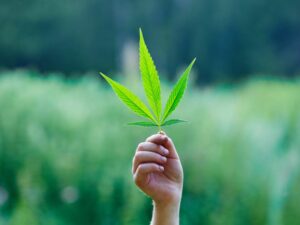Overview of THC

THC, or delta-9-tetrahydrocannabinol, is the main psychoactive compound found in the cannabis sativa plant. It is one of over 100 cannabinoids that have been identified in cannabis plants, is responsible for producing the “high” that is associated with cannabis use. THC works by binding to cannabinoid receptors in the brain and body, which can alter perception, mood, and cognition. THC is one of many compounds found in the cannabis plant, known as cannabinoids, and is typically the most abundant and well-known of them. THC has some medicinal properties, such as pain relief, anti-nausea, and appetite stimulation, but it is also known for its potential side effects, including anxiety, paranoia, and impaired memory and coordination. The legal status of THC varies depending on the jurisdiction, with some countries and states legalizing it for medical or recreational use, while others have strict laws prohibiting its use and possession.
How Does it Work?
THC works by interacting with the body’s endocannabinoid system, a complex network of receptors and neurotransmitters that help regulate many of the body’s functions, including mood, appetite, sleep, and pain sensation. When THC is consumed, it binds to specific receptors in the brain and body, producing a range of effects, including euphoria, relaxation, altered perception, and increased appetite.
Cannabis plants have been used for medicinal and recreational purposes for thousands of years, with evidence of its use dating back to ancient China and Egypt. Today, cannabis is legal for medical or recreational use in many countries around the world, and THC is a key component in many cannabis products, including edibles, oils, and tinctures.
While THC has many potential therapeutic benefits, it can also have negative side effects, including anxiety, paranoia, and impaired cognitive function. It is important to use cannabis derived products responsibly and under the guidance of a healthcare professional if using it for medicinal purposes.
Benefits of THC - Medical Marijuana, Anxiety Relief, and More

THC has a wide range of potential benefits, particularly in the field of medicine. Some of the medical applications of THC include:
Pain Relief
THC has been found to be effective in relieving pain, particularly chronic pain that is resistant to other treatments. THC works by binding to cannabinoid receptors in the brain and nervous system, which can help to reduce pain signals and increase pain tolerance.
Several studies have found that medical cannabis can be effective in treating various types of pain, including neuropathic pain (nerve pain), inflammatory pain, and cancer pain. In one study, patients with chronic neuropathic pain who were treated with THC reported significant reductions in pain and improved sleep quality.
THC is typically used in conjunction with other pain-relieving medications and therapies, and it’s important to consult with a healthcare professional before using THC for pain relief, particularly if you have any pre-existing medical conditions or are taking any other medications.
Anti-inflammatory Properties
THC (tetrahydrocannabinol) has been found to have anti-inflammatory properties, which can help to reduce inflammation and swelling throughout the body. Inflammation is a natural response of the body’s immune system to injury or infection, but chronic inflammation can contribute to a wide range of health problems, including autoimmune disorders, chronic pain, and cancer.
Studies have found that THC appears to reduce inflammation by interacting with the body’s endocannabinoid system, which is involved in regulating various physiological processes, including immune function and inflammation. THC works by binding to cannabinoid receptors in the brain and peripheral tissues, which can help to modulate the immune response and reduce inflammation.
One study found that THC was effective in reducing inflammation in mice with autoimmune disorders, while another study found that THC reduced inflammation and oxidative stress in rats with acute lung injury. Other studies have found that THC can be effective in reducing inflammation in conditions like arthritis, multiple sclerosis, and Crohn’s disease.
Anti-nausea Effects
THC (tetrahydrocannabinol) has been found to have anti-nausea effects, which can help to relieve nausea and vomiting caused by a variety of conditions, including chemotherapy induced nausea, motion sickness, and gastrointestinal disorders.
THC works by interacting with the body’s endocannabinoid system, which plays a role in regulating nausea and vomiting. THC binds to cannabinoid receptors in the brain and gastrointestinal tract, which can help to reduce the activity of certain neurotransmitters and reduce feelings of nausea.
Studies have found that THC can be effective in reducing nausea and vomiting caused by cancer chemotherapy, with some patients reporting significant improvements in their symptoms. In addition, THC has been found to effectively treat nausea and vomiting caused by other conditions like motion sickness and gastrointestinal disorders.
Appetite Stimulation
THC has been found to stimulate appetite, making it useful in treating conditions like cachexia and anorexia.
THC works by interacting with the body’s endocannabinoid system, which plays a role in regulating appetite and metabolism. THC binds to cannabinoid receptors in the brain and gastrointestinal tract, which can help to increase the activity of certain neurotransmitters and hormones that stimulate appetite.
Studies have found that THC can be effective in increasing appetite and promoting weight gain in patients with cancer and HIV/AIDS, with some patients reporting significant improvements in their appetite and nutritional status.
Mental Health Benefits
THC has been found to have potential mental health benefits, although more research is needed to fully understand its effects.
Some studies have suggested that THC may be effective in reducing symptoms of anxiety and depression, although the results have been mixed. THC works by binding to cannabinoid receptors in the brain, which can help to modulate the activity of certain neurotransmitters that are involved in regulating mood and emotions.
In addition, THC may also have neuroprotective properties, which can help to protect the brain from damage and reduce the risk of certain neurological disorders, such as Alzheimer’s disease and Parkinson’s disease.
However, it’s important to note that THC can also have potential risks for mental health, particularly in high doses or in people who are vulnerable to developing psychiatric disorders. THC has been associated with increased risk of psychosis, particularly in people with a history of psychotic disorders or a family history of schizophrenia. Therefore, it’s important to use THC products responsibly and under the guidance of a healthcare professional, particularly if you have any pre-existing mental health conditions.
Risks associated with THC use

While THC can have many potential benefits, there are also some risks associated with its use. Some of the potential risks of THC use include:
Impaired cognitive function
THC (tetrahydrocannabinol) has been found to impair cognitive function, particularly in high doses or in people who are vulnerable to developing cognitive impairment, such as adolescents and older adults.
THC works by binding to cannabinoid receptors in the brain, which can affect the activity of certain neurotransmitters that are involved in regulating cognitive function, such as memory, attention, and learning. Studies have found that THC can impair working memory, attention, and executive function, and can also affect the ability to learn and retain new information.
In addition, regular use of THC has been associated with structural changes in the brain, particularly in areas of the brain that are involved in memory and learning. These changes may increase the risk of developing cognitive impairment, particularly in people who use THC regularly or over a long period of time. Therefore, it’s important to use THC products responsibly and under the guidance of a healthcare professional, particularly if you are at risk of developing cognitive impairment.
Increased heart rate
THC has been found to increase heart rate in some people, particularly in those who are new to using THC or who are using THC in high doses.
THC works by binding to cannabinoid receptors in the brain and other parts of the body, including the cardiovascular system. When THC binds to these receptors, it can increase heart rate by stimulating the sympathetic nervous system, which controls the “fight or flight” response.
Studies have found that THC can increase heart rate by up to 50 beats per minute, particularly in people who are new to using THC or who are using THC in high doses. However, the effects of THC on heart rate may be less pronounced in people who use THC regularly, as they may develop a tolerance to its effects over time.
It’s important to note that increased heart rate can be a concern for people with pre-existing cardiovascular conditions, such as high blood pressure or heart disease. Therefore, it’s important to use THC products responsibly and under the guidance of a healthcare professional, particularly if you have any pre-existing cardiovascular conditions.
Respiratory problems
THC use has been associated with respiratory problems, particularly when THC is smoked or vaped.
Smoking THC can lead to respiratory problems such as bronchitis, chronic cough, and wheezing. THC smoke contains many of the same harmful chemicals as tobacco smoke, including tar and carbon monoxide, which can damage the lungs and increase the risk of lung cancer and other respiratory illnesses.
Vaping THC can also be associated with respiratory problems, particularly if the THC products are contaminated with harmful chemicals or if they are used at high temperatures. Vaping THC products at high temperatures can produce harmful chemicals and irritants, which can damage the lungs and lead to respiratory problems such as lung inflammation and lung damage.
Negative mental health effects
While THC can have some potential mental health benefits, such as reducing anxiety and depression in some individuals, it can also have negative effects on mental health, particularly in people who are vulnerable to developing mental health conditions.
Some studies have found that THC use can increase the risk of developing psychosis, particularly in people who have a family history of psychotic disorders or who are already at risk for developing psychosis. Psychosis is a mental health condition characterized by a loss of contact with reality, including symptoms such as hallucinations, delusions, and disordered thinking.
In addition, THC use has been associated with an increased risk of developing other mental health conditions, such as anxiety and depression, particularly in people who use THC regularly or in high doses.
It’s important to use THC products responsibly and under the guidance of a healthcare professional, particularly if you have a history of mental health conditions or are at risk for developing them. If you experience symptoms such as paranoia, anxiety, or hallucinations while using THC, it’s important to seek medical attention immediately.
Legal and social consequences
In many places, THC use is still illegal or heavily regulated. This can lead to legal consequences, including fines and imprisonment, as well as social consequences, including discrimination and stigma.
It’s important to use THC products responsibly and to weigh the potential risks against the potential benefits before using THC. If you have any concerns about the risks associated with THC use, it’s important to talk to a healthcare professional or other trusted advisor before using THC.
Differences between THC and CBD

THC (tetrahydrocannabinol) and CBD (cannabidiol) are both compounds found in the cannabis plant, but they have different effects on the body and mind. Here are some key differences between THC and CBD:
Psychoactive effects
THC is a psychoactive compound that produces a “high” or feeling of euphoria, while CBD is not psychoactive and does not produce a high.
Legal status
THC is illegal under federal law in many countries, while CBD is legal in many countries, provided it is derived from hemp and contains less than 0.3% THC.
Medical uses
THC has been found to be effective in treating pain, nausea, and insomnia, while CBD has been found to be effective in treating anxiety, epilepsy, and inflammation.
Side effects
THC can produce side effects like dry mouth, red eyes, impaired memory, and increased heart rate, while CBD is generally considered to be well-tolerated and produces few side effects.
Drug testing
THC can show up on drug tests for several days or even weeks after use, while CBD is unlikely to show up on drug tests after cannabis use.
Dosage
THC is typically used in much smaller doses than CBD, as it is more potent and can produce stronger effects.
It’s important to note that THC and CBD are often used together in cannabis products, and the effects of these compounds can vary depending on the specific product and the individual using it. As with any medication or supplement, it’s important to consult with a healthcare professional before using THC or CBD, particularly if you have any pre-existing conditions or are taking any other medications.
Different Forms of THC Products
There are several different forms of THC products available, each with its own unique benefits and drawbacks. Here are some of the most common forms of THC products:
Flower
The most traditional form of THC product is the flower, which is the dried and cured bud of the cannabis plant. It can be smoked in a joint, pipe, or bong, or vaporized in a vaporizer.
Edibles
Edibles are food products that have been infused with THC. They come in a wide range of forms, including baked goods, candies, and beverages. They can take longer to take effect than other forms of THC products, but the effects can last for several hours.

Tinctures
Tinctures are liquid extracts that have been infused with THC. They are typically taken sublingually (under the tongue) and are absorbed into the bloodstream quickly, producing effects within 15-45 minutes.
Concentrates
Concentrates are highly potent extracts of THC that are typically used for dabbing, a method of vaporizing the concentrate and inhaling the vapor. Concentrates can come in many forms, including shatter, wax, and oil.
Topicals
Topicals are creams, lotions, and balms that have been infused with THC. They are typically used for localized pain relief and do not produce the psychoactive effects associated with other forms of THC products.
It’s important to note that the effects of THC products can vary depending on the method of consumption, the potency of the product, and the individual using it. As with any medication or supplement, it’s important to consult with a healthcare professional before using THC products, particularly if you have any pre-existing medical conditions or are taking any other medications.
Laws Governing THC Use in the U.S.
THC (tetrahydrocannabinol) is still illegal at the federal level in the United States, but some states have legalized it for medical or recreational use. Here’s a brief overview of the laws governing THC use in the US:
Federal law
Under federal law, THC is classified as a Schedule I drug, which means it is considered to have a high potential for abuse and no accepted medical use. This means that THC is illegal to possess, sell, or use under federal law.
State Medical Cannabis Laws
Despite the federal prohibition, over 30 states in the United States have legalized medical marijuana, which allows individuals with certain medical conditions to use THC products with a doctor’s recommendation. The rules and regulations vary by state, but typically, patients must register with the state and obtain a medical marijuana card to access THC products.
Recreational use
As of April 2023, 15 states and the District of Columbia have legalized recreational marijuana, which allows individuals over the age of 21 to use THC products for non-medical purposes. The rules and regulations vary by state, but typically, individuals can purchase THC products from licensed dispensaries.
Hemp-derived CBD
The 2018 Farm Bill legalized hemp and hemp-derived CBD products, which contain less than 0.3% THC. These products are legal at the federal level and can be purchased online or in stores.
It’s important to note that the laws governing THC use are constantly evolving and can vary by state and locality. It’s important to research the laws in your area and consult with a healthcare professional before using THC products.



